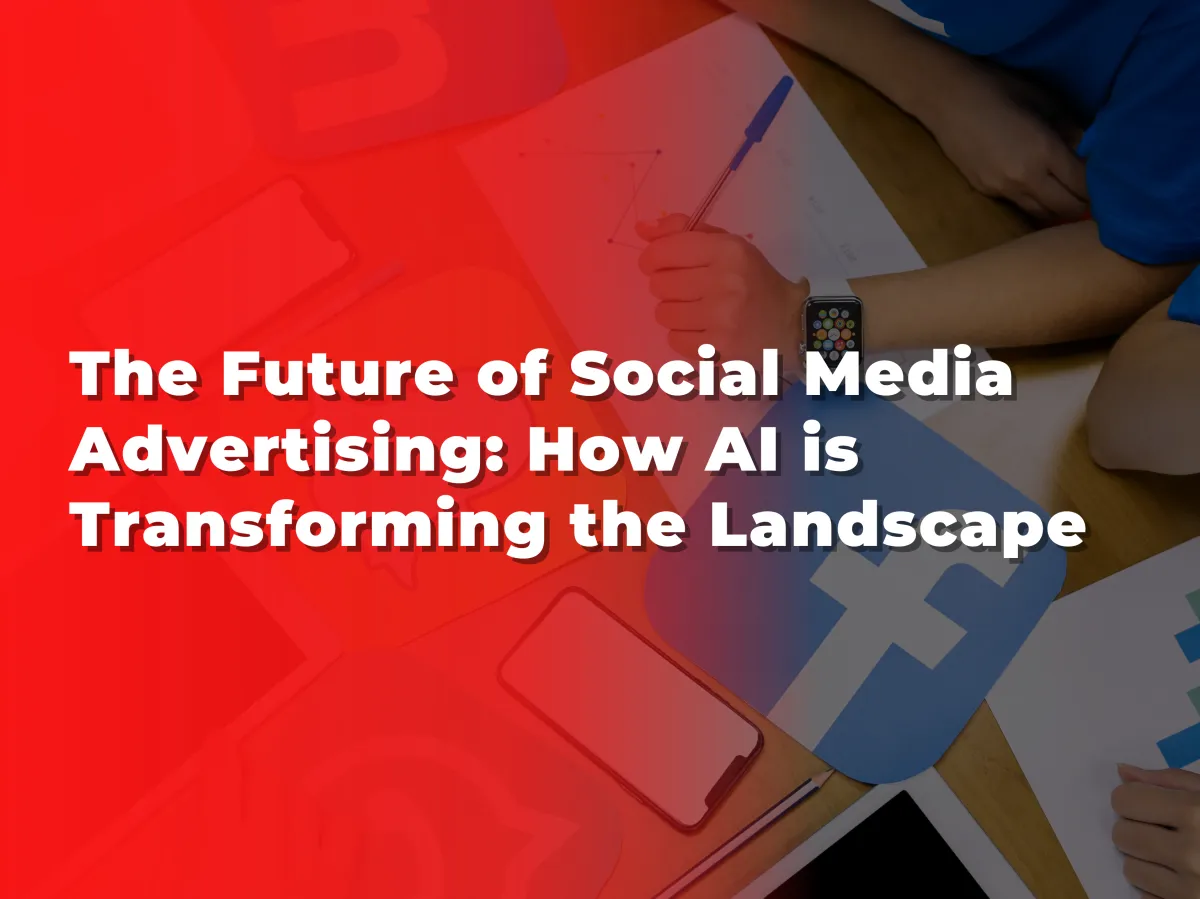Insights & Strategies
Elite Marketing Authority Blog
Stay Ahead with the Latest Trends in Digital Marketing

The Future of Social Media Advertising: How AI is Transforming the Landscape
:
The Future of Social Media Advertising: How AI is Transforming the Landscape
In the ever-evolving world of digital marketing, social media advertising has become a cornerstone strategy for businesses seeking to connect with their audiences. The vast reach and engagement potential of platforms like Facebook, Instagram, Twitter, and LinkedIn offer unparalleled opportunities for brands to promote their products and services. However, with this potential comes the challenge of standing out in a crowded and noisy digital space. Enter artificial intelligence (AI), a game-changer that is revolutionizing how brands approach social media advertising. AI-powered tools and technologies are enhancing the precision, efficiency, and effectiveness of ad campaigns, allowing businesses to achieve better results than ever before. In this blog post, we'll explore how AI is transforming social media advertising and what this means for businesses and marketers.
1. Personalized Advertising at Scale
One of the most significant advantages of AI in social media advertising is its ability to deliver personalized experiences at scale. Traditional advertising often relied on broad demographic targeting, which could miss the mark with many consumers. AI, however, leverages vast amounts of data from user behavior, preferences, and interactions to create highly targeted ad campaigns. This level of personalization ensures that the right message reaches the right audience at the right time, significantly increasing the likelihood of engagement and conversion.
Deep Personalization
AI enables deep personalization by analyzing user data such as past purchases, search history, social media interactions, and even the time of day they are most active online. For example, an e-commerce brand can use AI to target users who have previously shown interest in similar products but have not yet made a purchase. The AI system can then deliver ads tailored to these users, highlighting the benefits of the products they were interested in, offering personalized discounts, or showcasing user-generated content to build trust.
Dynamic Content Customization
Dynamic creative optimization (DCO) is another AI-powered technique that allows for real-time customization of ad content. DCO systems automatically generate different versions of an ad based on user data, testing various combinations of headlines, images, and calls to action. This approach not only improves ad relevance but also maximizes the efficiency of ad spend by focusing resources on the most effective combinations. For instance, an airline might use DCO to show different flight deals based on a user's location, past travel history, and preferred travel dates, making the ad more relevant and compelling.
2. Enhanced Ad Creation and Optimization
AI is not only improving ad targeting but also enhancing the creative aspect of advertising. With AI-powered tools, businesses can automate the creation of ad content, from copywriting to visual design. Natural language processing (NLP) algorithms can generate compelling ad copy, while image recognition technology can suggest visuals that align with the brand and audience preferences.
Automated Copywriting and Visuals
AI tools like GPT-3 and other NLP models can generate high-quality ad copy in seconds. These systems analyze vast datasets of successful ads and user interactions to craft messages that resonate with the target audience. For example, a fashion retailer can use AI to create multiple versions of ad copy highlighting different product features, such as fabric quality, fit, or style trends. Similarly, AI-driven design tools can analyze current design trends and recommend color schemes, fonts, and layouts that are likely to appeal to the target demographic.
A/B Testing and Continuous Optimization
AI also streamlines the process of A/B testing and ad optimization. By continuously analyzing the performance of different ad elements, AI systems can quickly identify which versions are most effective and adjust the campaign accordingly. This real-time optimization ensures that ads remain relevant and engaging throughout the campaign's duration. For example, if an AI system detects that ads featuring a specific product image are performing better, it can automatically prioritize that image across the campaign, thereby increasing overall engagement rates.
3. Predictive Analytics and Insights
Predictive analytics is another area where AI is making a substantial impact. By leveraging machine learning algorithms, businesses can predict future trends and consumer behaviors. This capability allows marketers to proactively adjust their strategies, anticipate market changes, and seize new opportunities.
Forecasting and Trend Analysis
AI-driven predictive analytics tools can forecast future trends by analyzing historical data and identifying patterns. For example, a retail brand can use AI to predict seasonal trends in consumer behavior, such as increased demand for certain products during holidays. This foresight enables businesses to plan their inventory, marketing strategies, and promotions more effectively. Additionally, AI can help identify emerging trends by analyzing social media conversations and other online data sources, allowing brands to capitalize on new opportunities before their competitors.
Sentiment Analysis and Market Intelligence
Sentiment analysis is a valuable AI application that gauges public sentiment towards a brand, product, or campaign by analyzing social media posts, reviews, and other user-generated content. This analysis provides marketers with insights into consumer perceptions and potential areas for improvement. For example, if a brand launches a new product, AI can analyze online conversations to determine whether the reception is positive, negative, or neutral. These insights allow the brand to adjust its messaging, product features, or customer service strategies accordingly.
4. Chatbots and Conversational AI
AI-powered chatbots and conversational AI are transforming how brands interact with their customers on social media. These intelligent agents can handle customer inquiries, provide product recommendations, and even assist with purchases, all in real-time. By offering instant responses and personalized assistance, chatbots enhance the customer experience and increase the likelihood of conversion.
24/7 Customer Support and Engagement
One of the most significant advantages of chatbots is their ability to provide 24/7 customer support. Unlike human agents, chatbots can handle multiple inquiries simultaneously, ensuring that customers receive prompt responses regardless of the time of day. This continuous availability is particularly valuable for global brands with customers in different time zones. For example, a beauty brand can use a chatbot to answer frequently asked questions about product ingredients, skincare routines, or shipping options, providing immediate assistance to potential buyers.
Data Collection and Personalization
Chatbots also serve as valuable data collection tools. By interacting with customers, chatbots can gather information about their preferences, needs, and pain points. This data can be used to personalize future interactions and marketing efforts. For instance, if a customer frequently asks about eco-friendly products, the chatbot can recommend sustainable options and notify the customer of related promotions. This personalized approach not only enhances the customer experience but also builds brand loyalty.
5. Ethical Considerations and Transparency
As AI becomes more integrated into social media advertising, ethical considerations and transparency become increasingly important. Businesses must ensure that their use of AI respects user privacy and complies with data protection regulations. Transparent communication about data usage and the role of AI in advertising can help build trust with consumers and mitigate potential concerns.
Privacy and Data Security
With the rise of AI, data privacy has become a critical concern for consumers. Brands must be transparent about how they collect, use, and protect customer data. This includes providing clear privacy policies and allowing users to opt out of data collection if they choose. For example, social media platforms often require users to consent to data collection practices, and businesses must adhere to these guidelines to maintain user trust.
Bias and Fairness in AI
AI systems are only as unbiased as the data they are trained on. If the training data contains biases, the AI's outputs may also be biased, leading to unfair or discriminatory advertising practices. Brands must be vigilant in ensuring that their AI systems are trained on diverse and representative datasets. Additionally, regular audits of AI systems can help identify and mitigate any biases, ensuring fair and ethical advertising practices.
Conclusion
AI is undeniably revolutionizing the world of social media advertising. From personalized ad experiences and enhanced creative processes to predictive analytics and conversational AI, the benefits of AI are vast and transformative. As businesses continue to embrace these technologies, they can expect to see more efficient, effective, and engaging advertising strategies.
For marketers, the key to success lies in understanding and leveraging AI's capabilities while remaining mindful of ethical considerations. By doing so, businesses can harness the power of AI to connect with their audiences in more meaningful ways and drive sustainable growth in the digital age. The future of social media advertising is bright, and with AI, brands can achieve new heights of innovation and success.
AI Tools for Social Media Advertising
Dynamic Creative Optimization (DCO) Tools
Google Marketing Platform
AI-Powered Copywriting Tools
Chatbots and Conversational AI
Predictive Analytics and Sentiment Analysis
Crimson Hexagon (now part of Brandwatch)
AI Image and Design Tools
Canva Pro
Sources and Articles on AI and Social Media Advertising
"The Role of AI in Social Media Marketing"
Social Media Examiner
"How Artificial Intelligence is Transforming Digital Marketing"
Forbes
"AI in Marketing: How Artificial Intelligence Can Impact Your Marketing Strategy"
"The Ethical Implications of AI in Marketing"
"What is Dynamic Creative Optimization?"
Marketing Land






